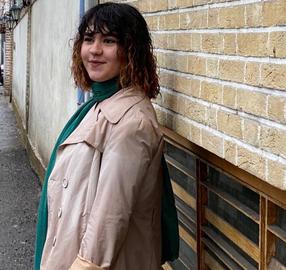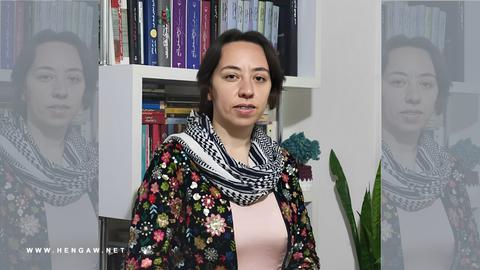When Halimeh Ali, a 51-year-old physician from Zabol who specializes in internal medicine, became the first female member of parliament to represent Sistan and Baluchistan, it was big news. In a region where women make up only 16 percent of senior officials and decision-makers, Ali’s victory constituted a potential change in the lives of women there. The appointment of two other women to governmental jobs in the region also boosted confidence that women’s needs might be better represented in government.
But although she raised a number of issues that affect her constituents in a May 11 2014 speech to parliament, from the need to boost free trade in the region to unemployment among educated young people to water distribution and subsidies for cattle feed, Ali said nothing about some of the most serious issues affecting the women in Zabol today.
Women have sat in parliament since the 1979 Islamic Revolution, but in numerical terms, they have not ever proportionally represented Iran’s female population. In the first parliament (1980-1984), only four women were elected to the 270-seat assembly. It was only in the fifth parliament (1996-2000) that their number reached 14, its highest level. In the eighth parliament (2008-2012) the number was reduced to eight. Since the beginning of the current parliament, only one new woman representative was elected, bringing the current total to nine women in parliament. While women enjoy relative equality in sectors such as education and health, according to the Global Gender Gap Report 2014, published by the World Economic Forum (WEF) on October 28, progress has been slow when it comes to economic participation and opportunity among Iranian women, and this includes political participation.
The Islamic Republic has a unique set of requirements for becoming a candidate for parliament. Candidates must be vetted by the Guardian Council, a powerful appointed body that also has the power to veto legislation. Except for representatives for recognized religious minorities such as Christians and Jews, the prospective candidate must be a Muslim who is committed to the Guardianship of the Islamic Jurist, the founding principle of the Islamic Republic. This means secular candidates and people with different views from those commonly held by the mainstream establishment are simply unable to take part in the parliament system or elections. Although in theory women who belong to recognized political groups and conform to Islamic Republic norms are eligible for office, the reality can be very different — often they face a number of obstacles and some of them are disqualified from running.
Perhaps Sistan and Baluchistan’s Halimeh Ali is constrained by social pressures stacked against women in general, whether they are MPs or not. Perhaps she feels that raising issues to improve the lives of women is futile, or that prioritizing the needs of everyone in Zabol will serve women in the community well. Certainly, since women have been elected to parliament, directly following the 1979 Islamic Revolution, they have made considerable achievements in improving the lives of women. But not all have supported the rights granted to women under international law and enshrined in international declarations, and throughout history, they have voted accordingly.
The First Parliament (1980-84): Women MPs Help Protect War Widows
During the Islamic Republic’s first parliament (1980-1984), issues pertinent to women were rarely included on the political agenda. Most of this first parliament’s time was spent on urgent domestic crises and the war with Iraq. But one important bill, drafted by Maryam Behroozi, did pass, stipulating that women would gain custody of their children after their husbands’ deaths. Though the law covered the death of a father in general, the amendment was particularly important at this time because many women were widowed during the war, and women needed to ensure the couple’s children would stay with the mother after the father’s death. Azam Taleghani introduced other bills to improve the situation of women, but they faced opposition and were rejected on the grounds that they were contrary to the constitution and Islamic laws.
Second Parliament (1984-1988): Opposition to Reform
During this period, MPs introduced a bill to provide insurance for single women without means to support themselves or who did not have guardians — but it faced entrenched opposition and failed to pass. “The cost to the government under the social conditions of those times made some believe that such a bill was not prudent,” wrote Maryam Behroozi in her memoirs. The mindset of many men, whether in parliament or not, contributed to the bill’s failure. “In public discussions and from the parliamentary forum, some men came up with counter-proposals,” said Behroozi. “Some suggested that the limit on the number of wives be removed so no woman would remain a widow or without a protector.”
During this era, only one bill passed that was directly relevant to women, allowing women who worked for the government to retire after 20 years.
The Third Parliament (1988-1992): Laws for the Family
The needs of children, the family, and to some extent, women, were more adequately recognized during this parliament, with 27 of 34 relevant bills being passed. Legal reform was needed to adequately assist a society recovering from a long and debilitating war with Iraq. Many families were left without fathers, and a large number of soldiers remained prisoners of war. New laws entitled families to soldiers’ salaries or insurance after their death, or in cases where male members of the family were still being held in Iraq.
The Fourth Parliament (1992-1996): MPs Call for Women’s Committee
As the 1990s got underway, MP Nafisah Fayaz called for a formation of a women’s parliamentary committee. It met with fierce opposition from hardline MPs and plans for its establishment were voted out. The committee was eventually created during the fifth parliament; however, during the sixth, in the early years of 2000, the committee was merged with the broader Committee on Social Affairs. It was eventually renamed the Women’s Faction by the seventh and eighth parliaments.
The Fifth parliament (1996-2000): Family Courts and Women’s Rights at Work
During the fifth parliament, 51 bills related to women, children and family were introduced, 37 of which were passed and approved by the Guardian Council. They included the formation of a special committee for women’s and family affairs, a provision for part-time female employees, court reform that led to the establishment of family courts, and an increase in the value of mehr (dowers) a man must pay his wife upon divorce.
The Sixth Parliament (2000-2004): Reformist Hopes
With the victory of the reformists and the election of President Mohammad Khatami, women MPs hoped for wide-sweeping reforms too. They renewed demands for more recognition in the law. For the first time, not all female MPs wore the full-length chador. The most important bill put forward by the Women’s Faction during this parliament was a call for Iran to join the international Convention on the Elimination of All Forms of Discrimination against Women. However, it faced stiff opposition from religious authorities. After some changes, parliament approved the bill and sent it to the Guardian Council, which then rejected it, claiming the convention was not in line with Iran’s constitution or Islamic tenets.
The Women’s Faction introduced several bills, including a revision of the law banning single woman students from studying abroad; reforms to divorce law; a bill governing the right of women to ask for divorce in cases of hardship; the proposal of a law to increase the age of children who should remain in the custody of mothers; a bill making “death compensation” equal for men and women, ending discriminatory laws of citizenship for women; the legalization of medically necessary abortions; the legalization of embryo donations; a bill introducing payment of alimony to women; and a bill stipulating that girls should have reached puberty and finished primary education before being legally permitted to marry.
The Seventh Parliament (2004-2008): A Conservative Environment
Just as women MPs during the reformist period (Sixth Parliament, 200-2004) reflected wider society and the politics of the time, so did female MPs reflect the more conservative majority in society and politics during Mahmoud Ahmadinejad’s presidency. All 12 woman MPs were conservative politicians; the Women’s Faction was barely active. In fact, it has been argued that the situation for women worsened during this period, not least because of the introduction of the so-called Family Protection Bill, which allowed men to take another wife without the consent of his first wife.
The Eighth Parliament (2008-12): Controversy
Only eight women were elected to this parliament. The passage of the controversial Family Protection Bill created a stir in politics, media, and in society in general. Parliament also passed a law that denied citizenship to the children of Iranian women who marry foreign nationals.
Women rights activists were adamantly opposed to the laws, and very critical of the MPs who supported them, but those behind the bill were successful, arguing the act would offer ample protection for women and families. There were no considerable obstacles to stop the bill to allow men to marry multiple wives passing into law.
The eighth parliament also quickly passed laws supporting gender segregation.
The Ninth Parliament (2012-16): Temporary Marriages and Gender Segregation
The current and ninth parliament includes nine female MPs. During this parliament, the Women’s Faction changed its name to the Women’s and Family Faction. From among dozens of proposed bills, only further provisions to the Family Protection Law have been passed. Not only do they not protect women’s rights, but, in many cases, they actively work against them.
During this parliament, one woman MP spoke out in defense of the provision for multiple wives, and for the law that allows for temporary marriages to be registered until the parenthood of a child is established. Rights activists spoke out against the MP, arguing that this allowed for a substantial erosion for women’s rights — and the rights of the child, and by extension, the family.
Earlier this year, parliament also signed a bill stipulating that women should only be allowed to work in public places of business from 7 am to 10 pm if these environments are not “mixed.” If a woman has a job that requires her to work at night, she must obtain a permit from the police. Another provision imposes fines on women who drive a car while wearing hejab deemed to not conform appropriately to Islamic values (so-called “bad hejab”) or eat while driving during the fasting hours in the month of Ramadan. Repeat offenders could get 10 demerits on their driving licences and their cars can be impounded for up to 72 hours.
Women MPs vote for such bills, thereby casting huge doubt over the claim that Iran’s women MPs have contributed anything to the lot of Iranian women. Although there are exceptions, It seems that in most cases, these politicians do not consider women’s issues to be important. They do not speak up for women, or go out on a limb for their causes. Instead, they act in accordance to the interests of their party and the Guardianship of the Jurist, exactly as dictated by the conditions for becoming a political candidate.
visit the accountability section
In this section of Iran Wire, you can contact the officials and launch your campaign for various problems
























comments